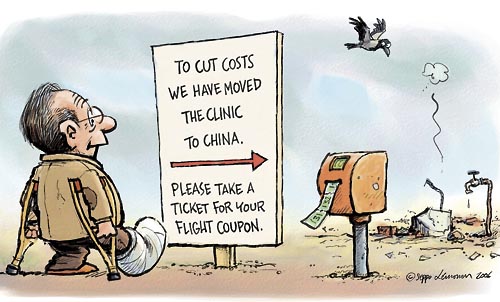
As a medical doctor, I read with concern claims by the opposition that rising health costs are the fault of "government mismanagement". Even more worrying were promises by the opposition to provide cheaper medical care (with one politician reminiscing of low healthcare costs in the 70s and 80s), with plans such a welfare scheme put forward by some parties, as if this were an end-all solution.
The reality is that healthcare is getting exponentially more expensive, by processes beyond the control of any government. The “cheap and easy” gains in health outcomes, such as vaccinations and sanitation, have been already been achieved. With demographic shifts reflecting those of first world countries, Singapore would soon be facing increasingly complex healthcare issues that require new, and often expensive, solutions. These would include an ageing population, with people living longer and developing more illnesses associated with old age (such as dementia, cancer and arthritis). Recent economic analyses from the US have demonstrated that any cost-saving from addressing preventable illnesses will be offset by these unavoidable “diseases of old age”.
Rapid advances in technology also mean that medical care today is a far cry from medical care from yesteryear (especially from the "good old 70s"). We have a larger number of more powerful drugs to treat conditions, many of which are being detected with more sophisticated tests. Technology has revolutionized medical practice, such as fibre-optic imaging in keyhole surgery. However, all of these advancements involve significant R&D costs, into the millions of dollars, which are then transferred to the end-users. By positioning ourselves as a medical hub, Singaporeans effectively now have access to these latest developments. However, if we want to continue to enjoy the latest pharmaceuticals or the most advanced imaging and surgical techniques, we will need to face the burgeoning costs associated with them.
What this means, is that healthcare is becoming more expensive at a rate never seen before, bringing the issue of healthcare costs to the forefront in many political debates around the world (the most recent, and perhaps significant, are the healthcare reforms in the USA). The best minds from around the world have sought a solution, but no easy answer has yet been found. Ultimately, the costs have to be borne by someone – in Australia and the UK, the governments have borne the costs through a welfare system. However, this is translated to significantly higher taxes for the people (close to 50% for some categories!) Even then, these governments are frantically searching for a way to curb the ballooning healthcare expenditure that is pushing the countries deeper into debt (as a friend of mine says – health care expenditure is basically a black hole). On the other hand, the USA has attempted to use a free market approach in an attempt to drive healthcare costs down via competition. Unfortunately, this has backfired for a number of reasons, leading to even basic healthcare being out of reach of a significant proportion of the population.
We should thus take any blanket promise of lower healthcare costs with a grain of salt, being aware that there is no simple answer to this complex issue. As the election draws close and more promises are being made, we should be wary of such utopian offers, realizing that there is no magic bullet to ease the pain of rising medical costs.
My 2 Cents, on probably the only topic I'm familiar with.
Sing Chee
No comments:
Post a Comment